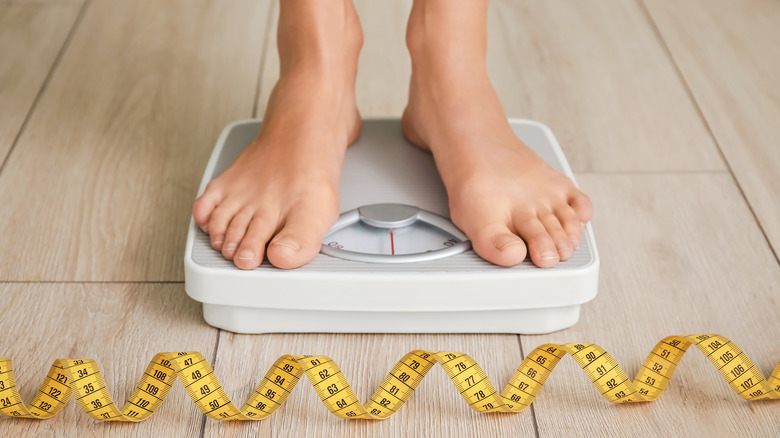Why Some Doctors Warn Against The Lectin-Free Diet - Exclusive
When celebrities have massive makeovers, everyone is always dying to know their secrets. For Kelly Clarkson and Usher, their supposed key to dramatic weight loss was a lectin-free diet. But many health and nutrition experts not only doubt the diet's results, but warn against going on the diet at all.
Lectins, Healthline explains, are "proteins that bind to carbohydrates" and are found in a variety of foods: legumes, like beans and peanuts; nightshade vegetables, like tomatoes and eggplant; dairy; and grains, like quinoa and rice. Most lectins are safe to eat but some, like beans, if not cooked properly can lead to severe nausea, vomiting, and other digestive issues.
These digestive issues are one of the main reasons Dr. Gundry, the doctor credited for Clarkson and Usher's weight loss, pushes a lectin-free diet. According to his website, any consumption of any legume, especially if you have celiac or gluten sensitivity, can lead to inflammation and sickness as lectins "help...bacteria and viruses stick to...the cells in the body," causing more sickness and infection. The problem with Dr. Gundry's magic cure for celiac disease, bloating, and weight loss is not only are not all lectins toxic, but those that can cause issues aren't a major part of an American's diet anyway, per The Washington Post.
But like with other fad diets such as the werewolf diet or apple cider vinegar diet, actual, long-lasting, health results are rarely the reward for what can be very dangerous eating restrictions.
Why the lectin-free diet probably won't help you lose weight
If you're looking to lose weight, fad diets promise to give you what you want quickly and simply. But as Dr. Stacey Rosenfeld, founder of Gatewell Therapy Center, explained to us, not only can any food restrictions be harmful, but "fad diets can be especially detrimental, as they're often more restrictive and more highly marketed than the...diets we typically encounter." She added that while you may see temporary results, these diets are more likely to leave you with eating issues than a healthy body. The only proven method of weight loss, studies show, is burning more calories than you eat in a day.
If your body can't process lectins, it makes sense to cut them from your diet. But for those without a lectin sensitivity, research does show that eating lectins potentially gets in the way of your body's ability to properly absorb nutrients — many of which are found in foods with lectin, per Healthline. Cara Rosenbloom, a registered dietitian, explained to The Washington Post that you get rid of up to 95% of the lectins just by cooking them, making them completely safe to eat. While we all might snack on a piece of uncooked spaghetti, you probably wouldn't make a meal out of uncooked rice or beans.
With the lectin-free diet, you're needlessly cutting out a food group, like gluten, which can be detrimental not just to your physical health, but mental health as well.
You actually need foods with lectins in them, experts say
Eliminating what seems like a single food group from your diet sounds like an easy way to lose weight, but the complications from this so-called diet far outweigh the scientifically-shaky results.
For one, cutting food with lectins means cutting a lot of fiber from your diet, per Healthline. Plus, many foods with lectins also have proteins, fats, vitamins, minerals, and antioxidants that, as Everyday Health points out, are necessary for a balanced, healthy body and diet. In fact, studies have found that eating whole grains actually lowers the risk of death from cardiovascular disease. Plus, as registered dietitian Julie Lanford told Everyday Health, these foods often have "disease-preventing properties" and help promote a healthy cholesterol and gut health.
Lanford also echoed Dr. Stacey Rosenfeld, adding that limiting what foods you can eat often sets people up for eating disorders. "If you're constantly anxious about your food choices and how they will affect your body or operate under a lot of food rules," Lanford explained, you can condition yourself into developing an eating disorder.
"Rather than using a generalized approach and trying to apply it to everyone," registered dietitian Katherine Zeratsky writes for Mayo Clinic, "a diet that's structured and overseen by a dietitian and based on scientific evidence can be customized to accommodate a person's individual sensitivities." Ultimately, these are the diets that are not only the healthiest and safest, but can provide the lasting results you're looking for.


